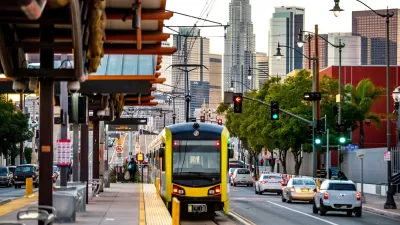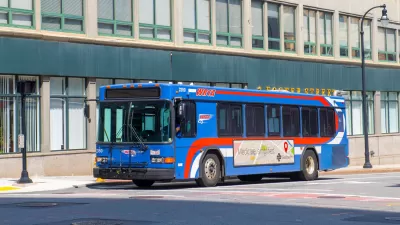Do transit stations with sleeker designs boost ridership? Evidence suggests that the answer may be yes. But does that mean that we should spend limited transit funds on better architecture?
A recent study out of the University of Naples compared ridership on two similar lines, only one of which had colorful, recently-redesigned stations. The researchers found that riders were willing to put up with more, including higher costs and longer wait times, at the nicer stations.
But, Eric Jaffe points out, station architecture shouldn’t be privileged over all other improvements. “In a world with infinite resources, no doubt all riders would want transit stations to be unparalleled destinations,” he writes. “In this actual world, at this particular time, let’s not forget that even the nicest hallway is just another way to get from here to there.”
FULL STORY: Nicer Transit Stations Attract More Riders

Planetizen Federal Action Tracker
A weekly monitor of how Trump’s orders and actions are impacting planners and planning in America.

Maui's Vacation Rental Debate Turns Ugly
Verbal attacks, misinformation campaigns and fistfights plague a high-stakes debate to convert thousands of vacation rentals into long-term housing.

Restaurant Patios Were a Pandemic Win — Why Were They so Hard to Keep?
Social distancing requirements and changes in travel patterns prompted cities to pilot new uses for street and sidewalk space. Then it got complicated.

In California Battle of Housing vs. Environment, Housing Just Won
A new state law significantly limits the power of CEQA, an environmental review law that served as a powerful tool for blocking new development.

Boulder Eliminates Parking Minimums Citywide
Officials estimate the cost of building a single underground parking space at up to $100,000.

Orange County, Florida Adopts Largest US “Sprawl Repair” Code
The ‘Orange Code’ seeks to rectify decades of sprawl-inducing, car-oriented development.
Urban Design for Planners 1: Software Tools
This six-course series explores essential urban design concepts using open source software and equips planners with the tools they need to participate fully in the urban design process.
Planning for Universal Design
Learn the tools for implementing Universal Design in planning regulations.
Heyer Gruel & Associates PA
JM Goldson LLC
Custer County Colorado
City of Camden Redevelopment Agency
City of Astoria
Transportation Research & Education Center (TREC) at Portland State University
Jefferson Parish Government
Camden Redevelopment Agency
City of Claremont





























